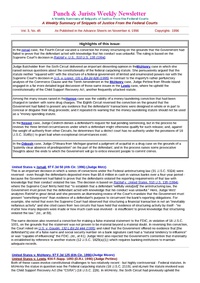Case held that defendant who was charged with "using" a firearm had waived his rights to argue that his conviction was in any way infirm - but see Bousley v. U.S., L.Ed.2d (1998).
In the aftermath of Bailey v. U.S., 133 L.Ed.2d 472 (1995), the courts have faced …
Following a series of appeals, and the vacation of his original sentence, the defendant in this case argued that the district court had violated his rights under the Double Jeopardy Clause when, at the resentencing, it imposed an upward departure which it had originally refused to apply at the …
One issue addressed by the Court in this decision was alleged improper comments made by the prosecutor during summation. The Court emphasized that a conviction will be reversed for improper comments only if the statements substantially prejudiced the defendant. The Court then continued that although "a prosecutor may not …
This is a rare case in which a conviction was reversed because the district court failed to inform the defendant of the nature of the charge to which he was pleading guilty, in violation of Rule 11 of the Fed.R.Crim.P. At the guilty plea allocution, the Government made its …
It has become standard practice in virtually every drug case to add the charge of money laundering, not only because it adds one more salacious charge which the prosecutor can use to persuade the jury that the defendant truly is the devil incarnate, but also because sentences under the …
The defendant in this case was sentenced on November 2, 1992, one day after the Guidelines were amended to provide for an additional one-point reduction for acceptance of responsibility. He filed a motion seeking the additional point and the Government opposed the motion on the grounds that (a) the …
QUOTE OF THE WEEK - Entrapment: a putrescence that threatens to spoil basic concepts of fairness and justice.
"The religious and political refugees who came to this land at the turn of the century had much to fear from the old country's secret police, but one of the greatest …
Court granted a judgment of acquittal based on a "patently clear absense of predisposition.".
This is an important entrapment case that gives vitality and fresh meaning to the concept of "predisposition" and raises disturbing questions about the end to which the Government will go to sate its thirst …
Relying on the Supreme Court's decision in Ratzlaf v. U.S., 510 U.S. 135, the Fourth Circuit vacated a money structuring conviction on the ground that the Government had failed to prove the defendant acted with knowledge that his conduct was unlawful.
This is an important decision in which …
United States v. McHenry, 97 F.3d 125 (6th Cir. 1996) (Judge Moore)
United States v. Lewis, 936 F.Supp. 1093 (D.R.I. 1996) (Judge Pettine)
Both of these cases involve constitutional challenges to two relatively recent - but highly controversial - federal statutes. In McHenry the statue in question was the …
Here the Court held that there was no violation of the defendant's Confrontation Clause rights by allowing the Government to present the testimony and permit the cross-examinatioin of a pregant witness by telephone.
One of the issues raised in this appeal was a decision by the trial judge …
One of the issues raised in this appeal from a drug conviction was whether the district court properly imposed a four-level sentence enhancement under U.S.S.G. § 2K2.1(b)(5) based on mere proximity to a gun. When the defendant in this case was arrested, both marijuana and a gun were found …
Case held that defendant who was charged with "using" a firearm had waived his rights to argue that his conviction was in any way infirm - but see Bousley v. U.S., L.Ed.2d (1998).
Here the Court analyzes the three exceptions to the general rule that a defendant has no right to bail after conviction but before sentencing.
This case explores the bases upon which a defendant, having been convicted of a federal crime, may be released on bail pending sentencing. Judge …
Case held that even where a defendant is mentally impaired and the officer was aware of the impairment, a confession will be suppressed as involuntary only if the officers use coercive measures to take advantage of the impairment.
Case is noted for Judge Batchelder's dissent, which raised probong questions about the constitutionality of the Federal Carjacking Statute, which she argues neither sqaures with a Government of limited and enumerated powers nor with US v. Lopez.
United States v. McHenry, 97 F.3d 125 (6th Cir. 1996) (Judge …
Among the many issues raised in this case was a claim that the trial judge had shown improper partiality towards the Government's case, in violation of Rule 614(b) of the Fed.R.Evid. In rejecting that claim, the Court held that : "Our cases addressing claims of improper judicial questioning have …
One of the issues discussed in this case was the defendant's claim that the district court's refusal to grant him an adjustment for acceptance of responsibility after he went to trial amounted to a penalty for the exercise of his Sixth Amendment right to trial by jury. The Court …
